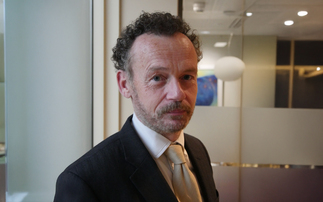In his first interview since becoming Threadneedle CEO, Campbell Fleming says outperformance alone is no longer enough for a top tier asset manager - and expresses concern charges may go up 'at every level' post-RDR.
Continued from previous page...
Such decisions may also be delayed by Threadneedle’s recent decision to switch its transfer agency from BNY Mellon to IFDS; a move the group said would improve service levels for its clients.
The switch is expected to be completed by this summer. It may then lead to a merging of the fund range Threadneedle acquired in 2011 when it purchased the asset management business of LV=.
Threadneedle CEO on performance and fees
“The track record has improved on those LV= funds since we took over, and given our managers are running their own OEICs alongside, at some point having both does not make sense,” Fleming said.
The run-up to RDR has seen a notable rise in fund mergers as groups tidy up their ranges, but the concentration of fund flows has also meant an uptick in the number of funds that are soft-closing.
Fleming said the industry will have to become cleverer in the way it deals with the issue.
“It does present a problem, and it can be difficult to unravel if these products are used on platforms and in model portfolios. FCA requirements mean we as an industry need to more industrially address the issue of liquidity and capacity, through products that are perhaps not completely open-ended.”
One potential solution that will gain prominence, he suggested, is funds making provisions for a limited number of shares or units to be issued.
‘Better beta’
While Threadneedle’s focus remains firmly on active management, Fleming also revealed the group is giving thought to ‘better beta’ products, particularly given some of its existing institutional mandates.
“The main thing we are focused on is active products, but we are keeping a watching brief on better beta or enhanced index products. Some of the institutional money we run already is almost enhanced better beta in style.”
Elsewhere, as an early adopter of absolute return retail fund strategies, Threadneedle has not been put off the asset class by the issues surrounding classification of the vehicles.
Fleming said investors were of a similar mind and suggested the group will look again at its own offerings in the area.
“The success of Carmignac and Standard Life Investments [in this space] shows people can deliver. Clients are voting with their wallet.
“They and advisers get this strategy and see where it fits with their strategy. There is an opportunity to innovate professionally and responsibly.”
Last year Investment Week revealed Threadneedle was one of four groups looking to enhance their direct-to-consumer proposition in the run-up to RDR, but Fleming is quick to rule out any concerted play in this space.
“Crispin Henderson was concerned we did not have any digital capability, and, if there was an exodus of advisers post-RDR, we would end up in loco parentis.
“We are yet to decide whether we roll out a full digital service where you can buy or sell. We will look again once we finish our transfer agency process. But [catering for orphaned clients] would be the full extent of our D2C offering. We are not taking on Hargreaves Lansdown or Fidelity.”
A potential rise in clients who no longer have advisers is one unintended consequence of RDR, and Fleming is concerned about other impacts of a move away from a commission-based system.
“When you disaggregate the value chain, and people seek to justify how much they charge for their services, they will say ‘it is worth this much’. Prices will potentially go up at every level. I am concerned about that.”
Responding to the post-RDR environment and a more hands-on regulator in the shape of the Financial Conduct Authority will require a more diligent approach from fund groups, according to the CEO.
That will mean investing more time, more effort and more money in understanding what clients want, Fleming said.
For Threadneedle in this regard and others, the focus is on “extending our obsession with performance and becoming more obsessed with customers”, he concluded.
CV: Campbell Fleming
2013
Threadneedle CEO
2009
Joined Threadneedle as head of distribution
1998-2009
Joined JP Morgan Chase as it took over Robert Fleming in the late 90s; became MD for J.P. Morgan’s UK asset management business
1997
Joined Robert Fleming Asset Management, rising to become a director
1990
Legal officer at the Australian Securities Commission













